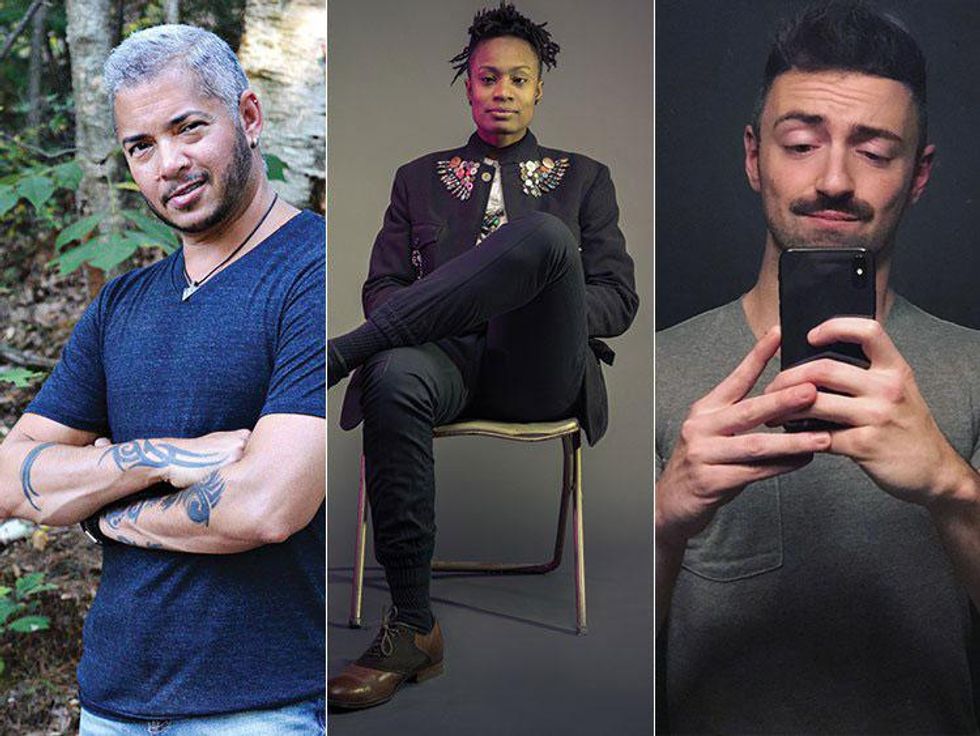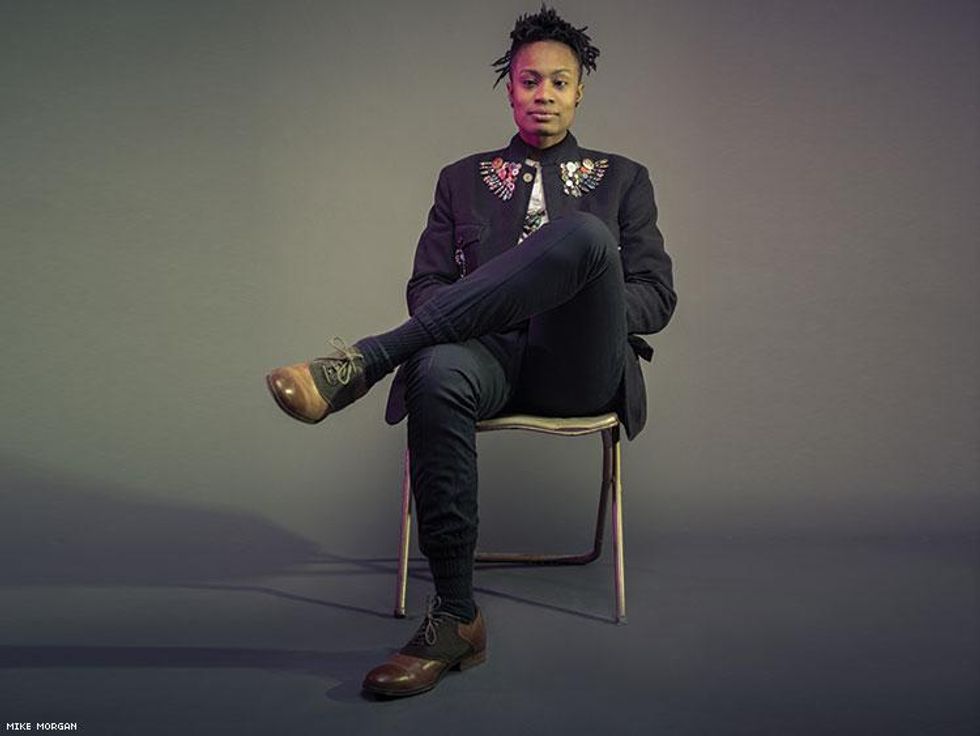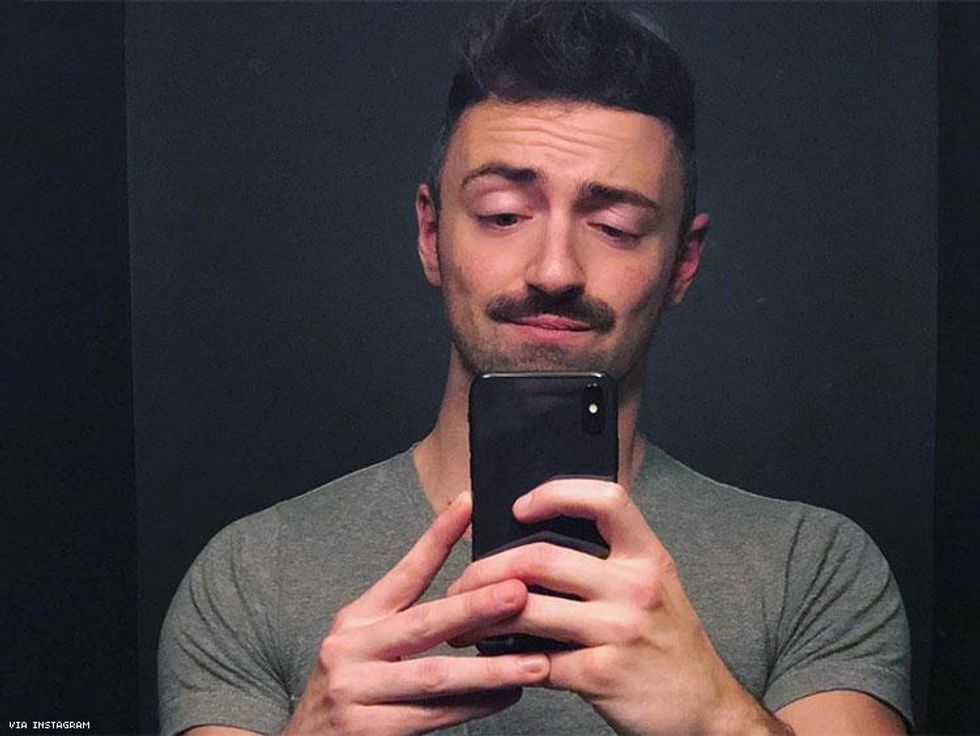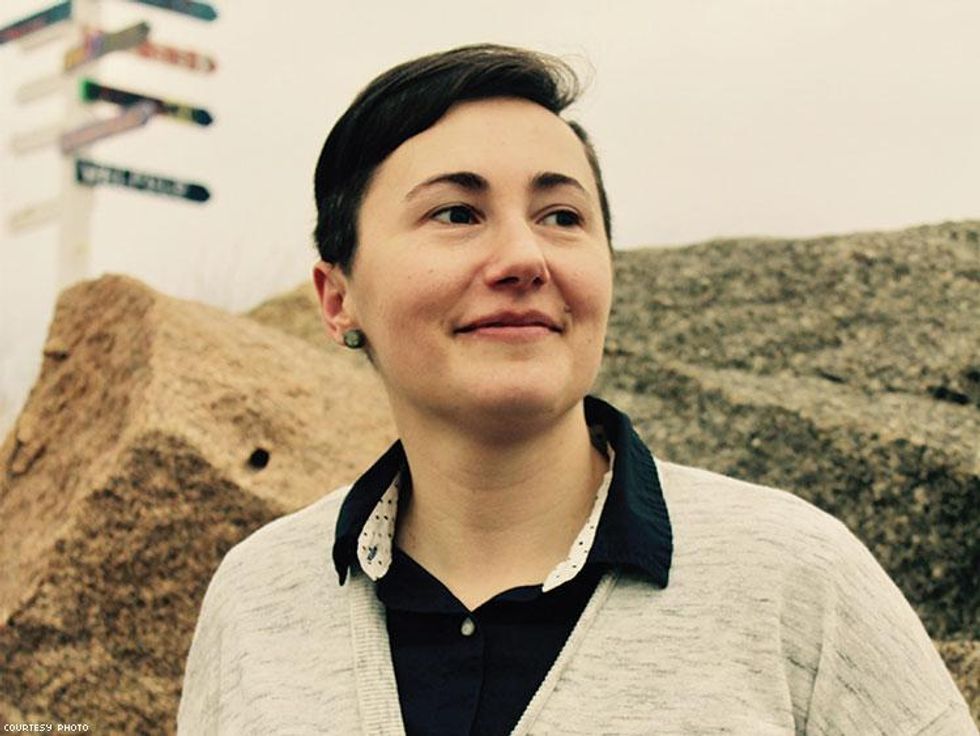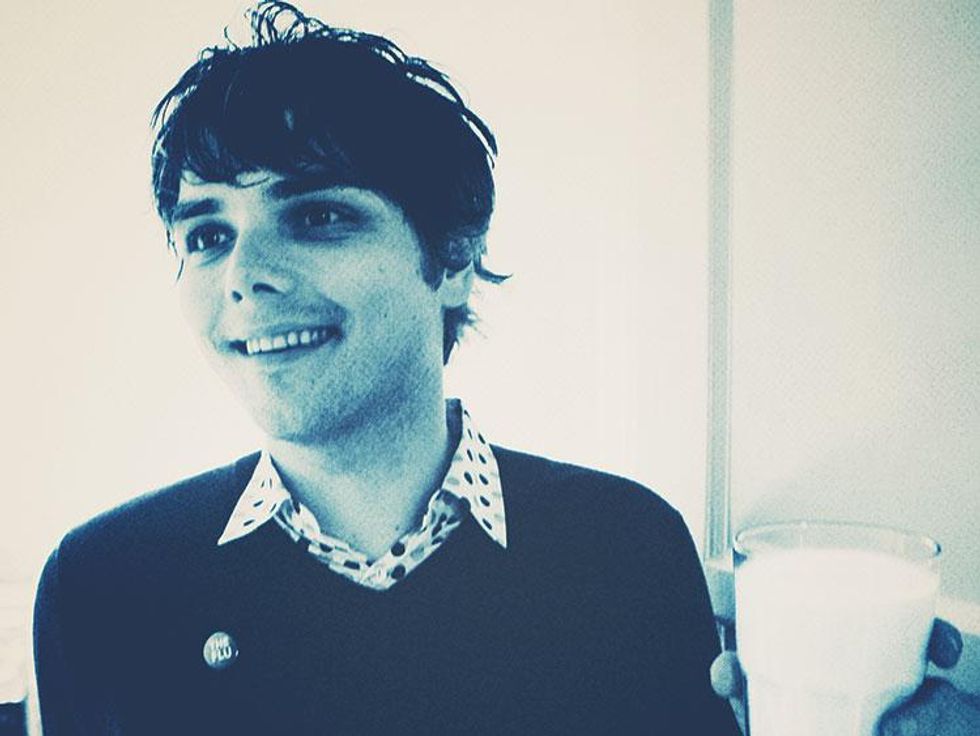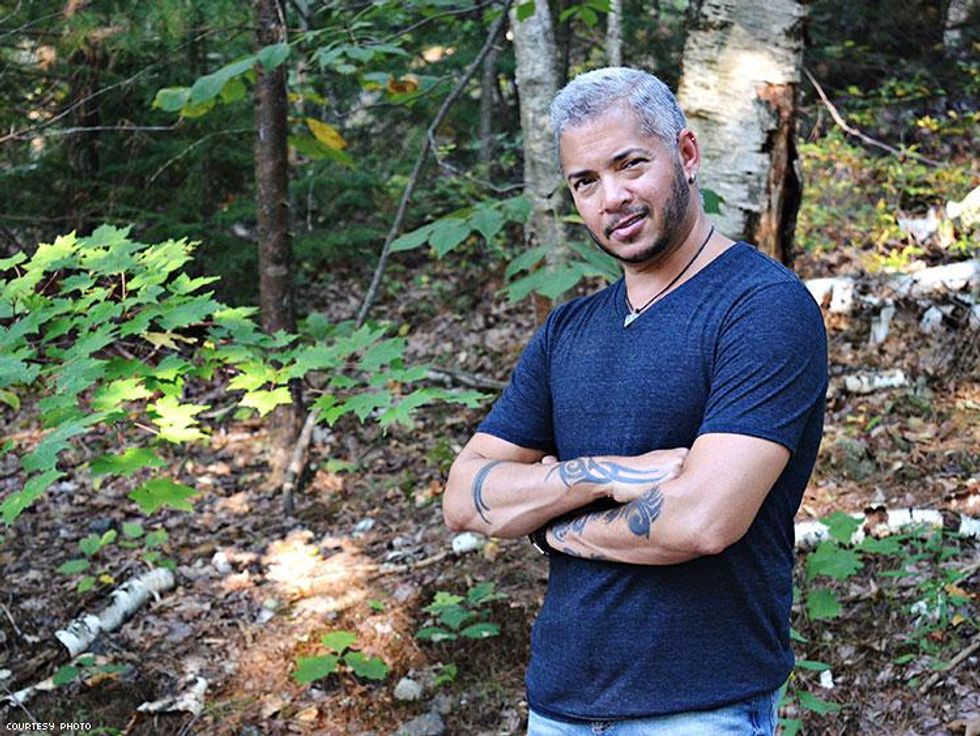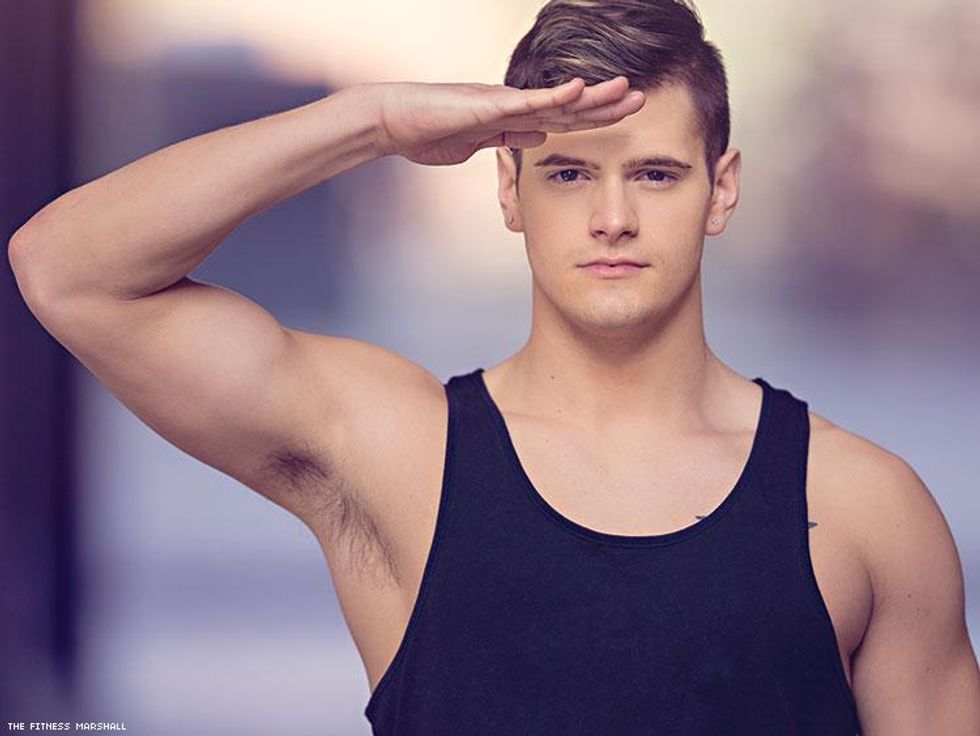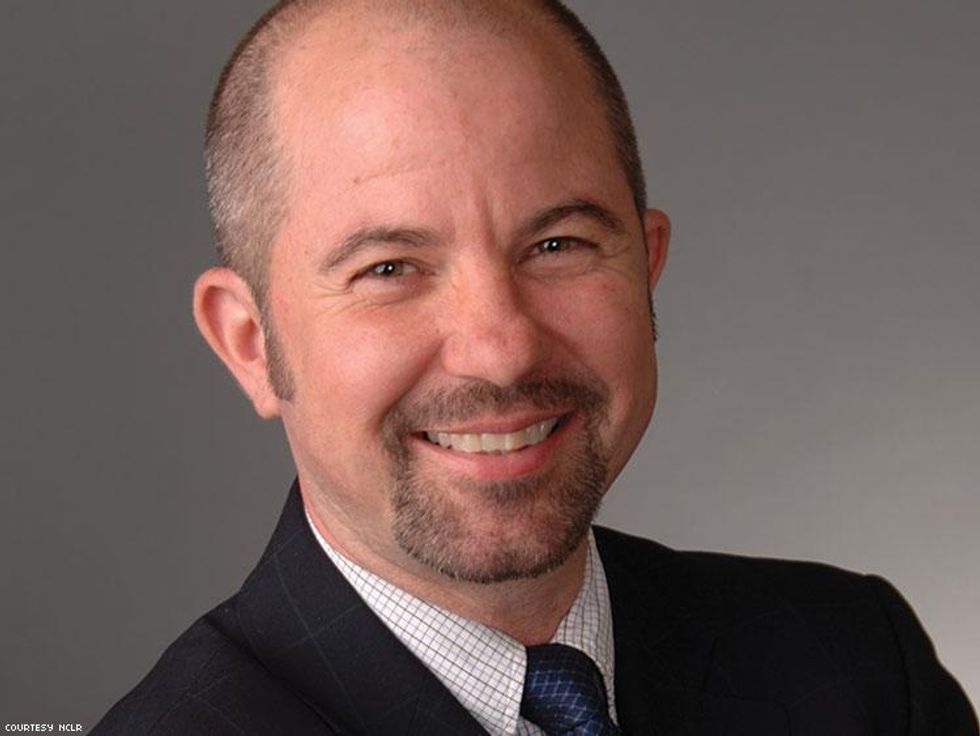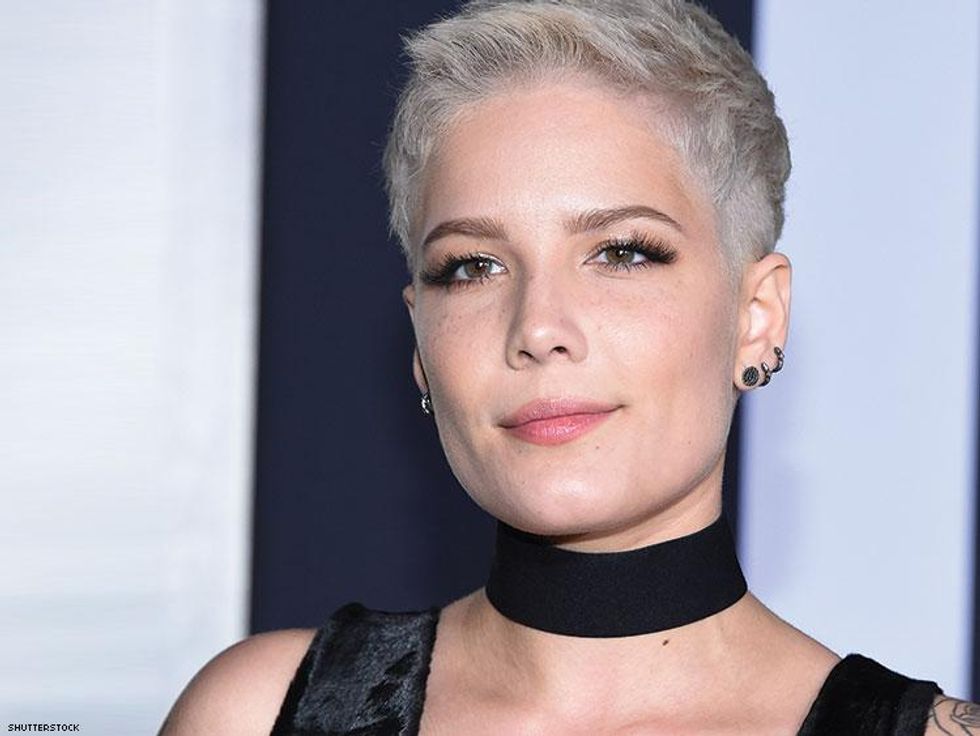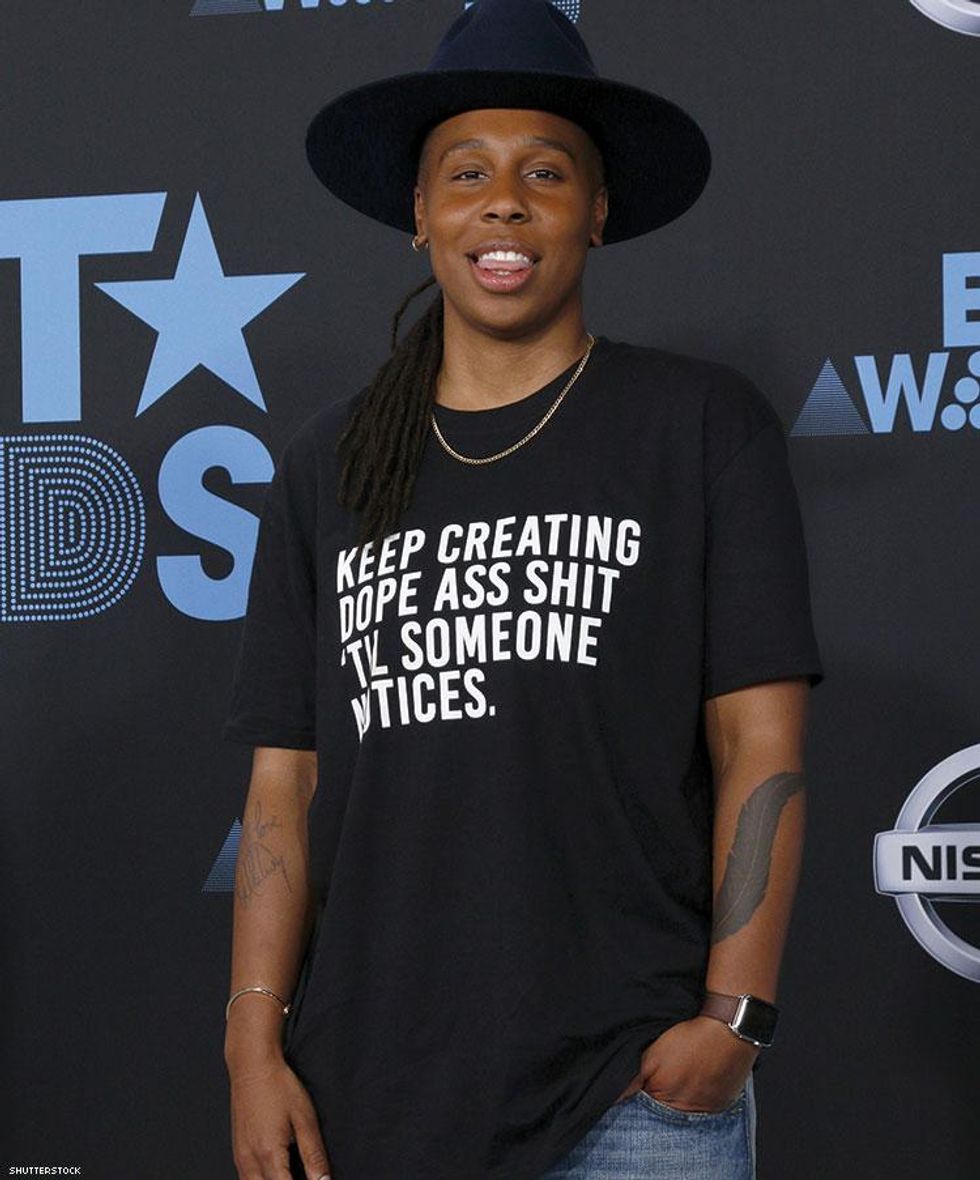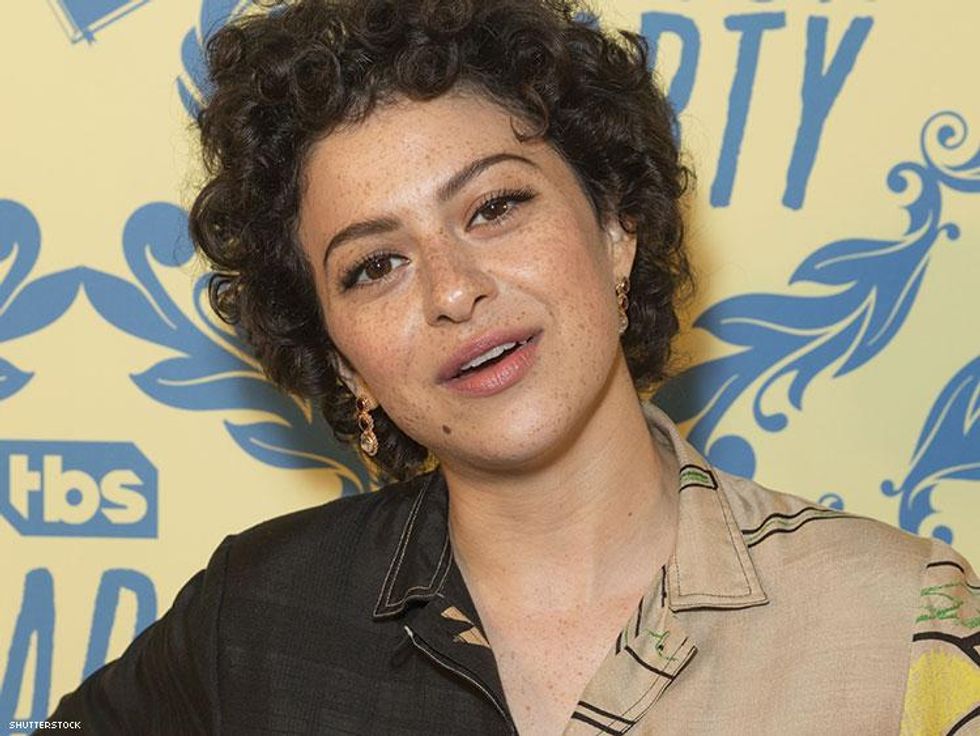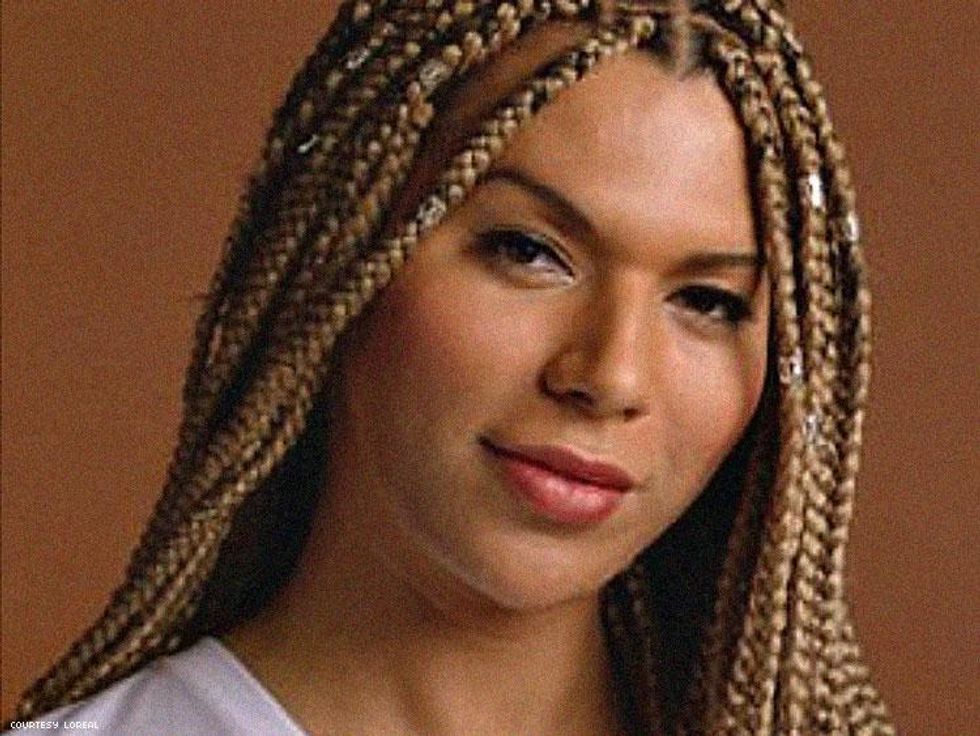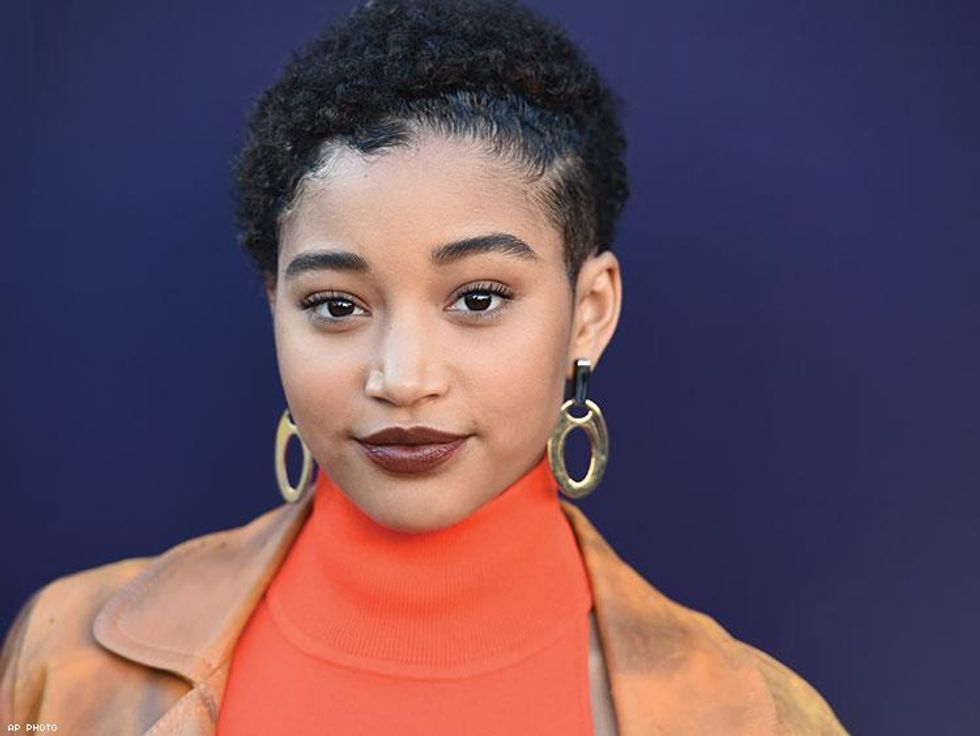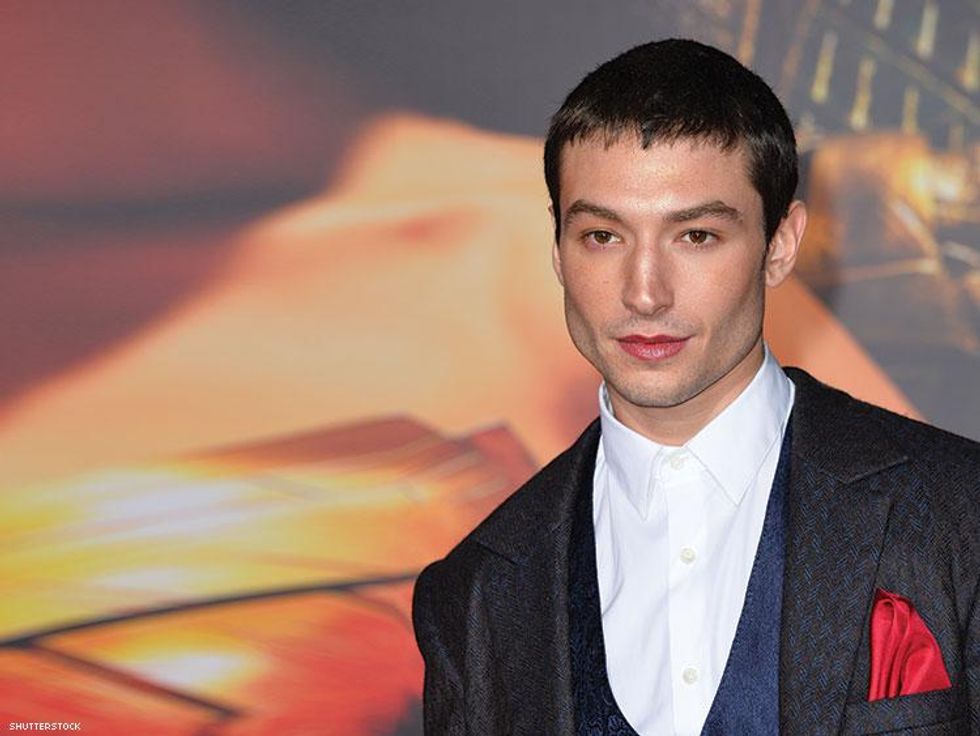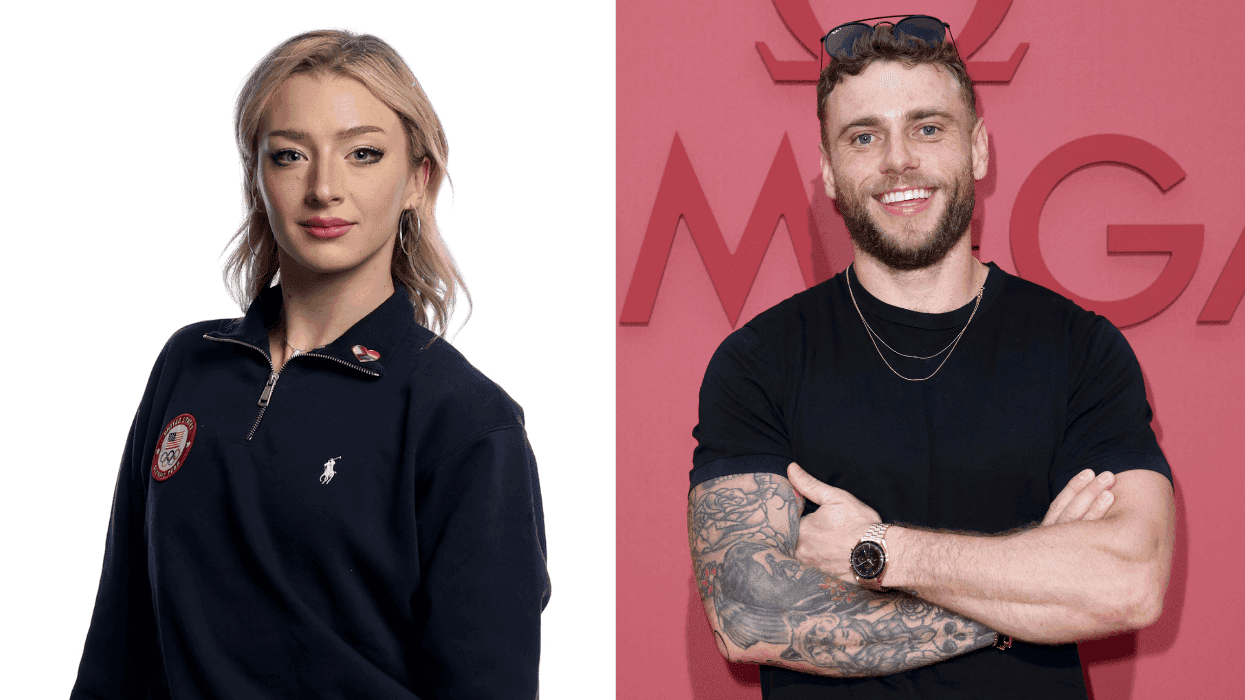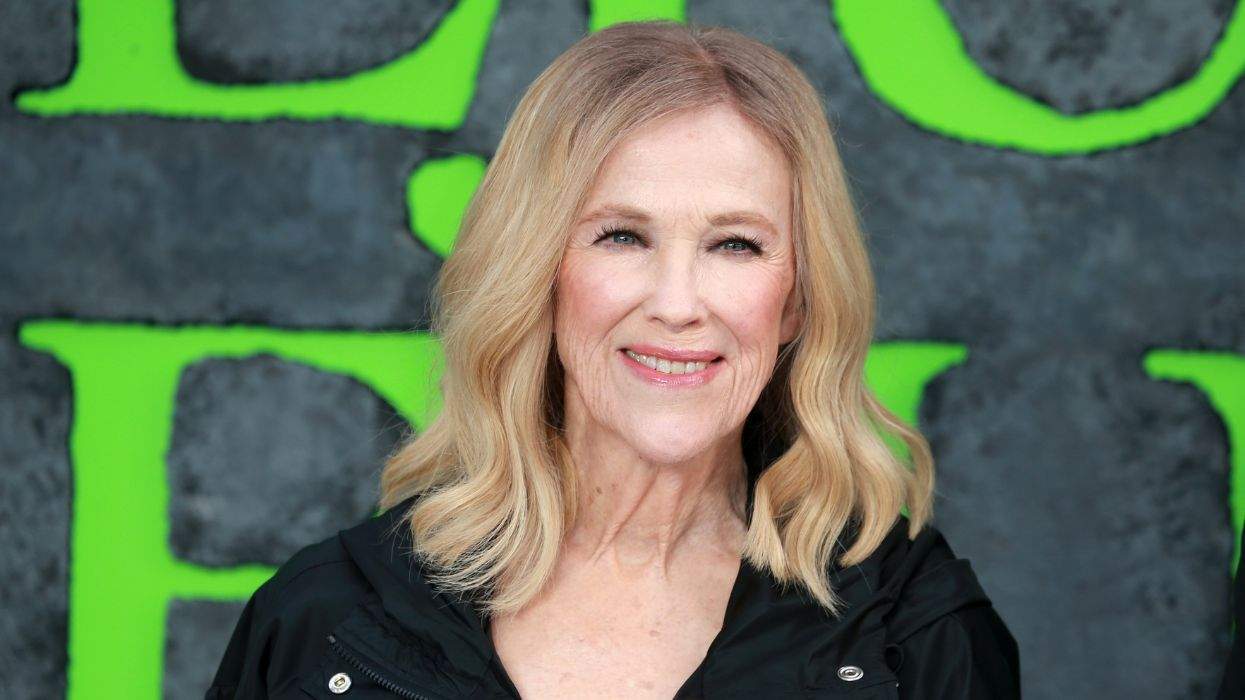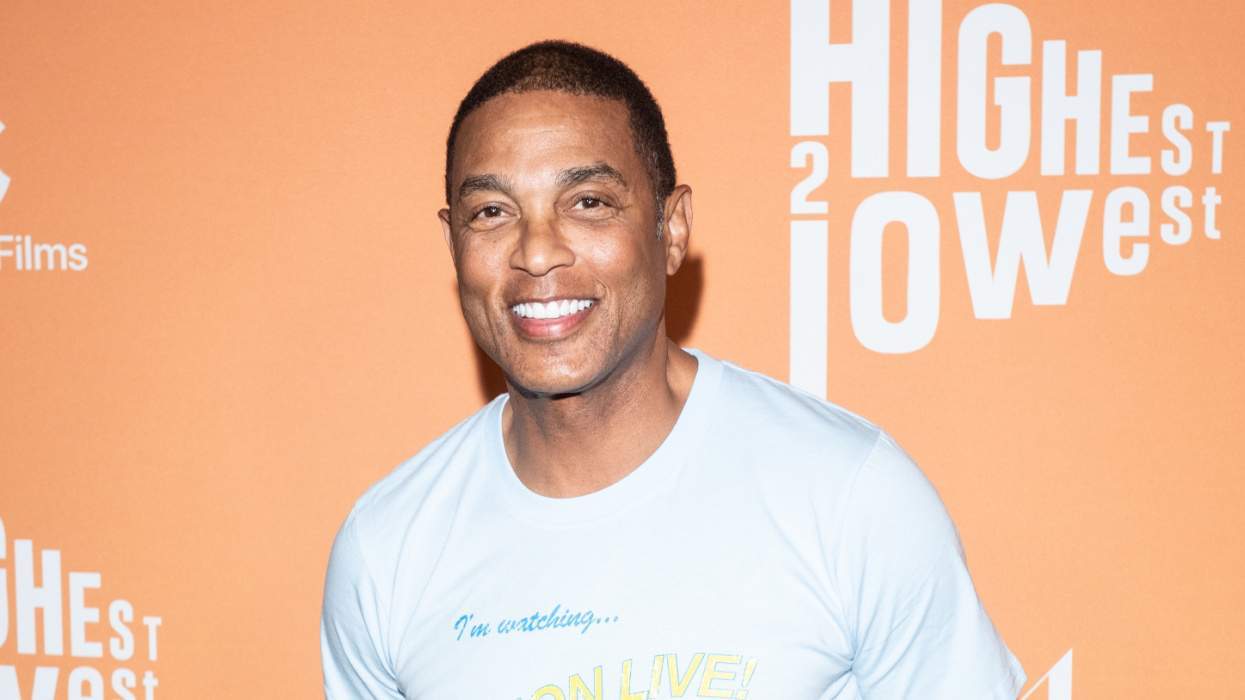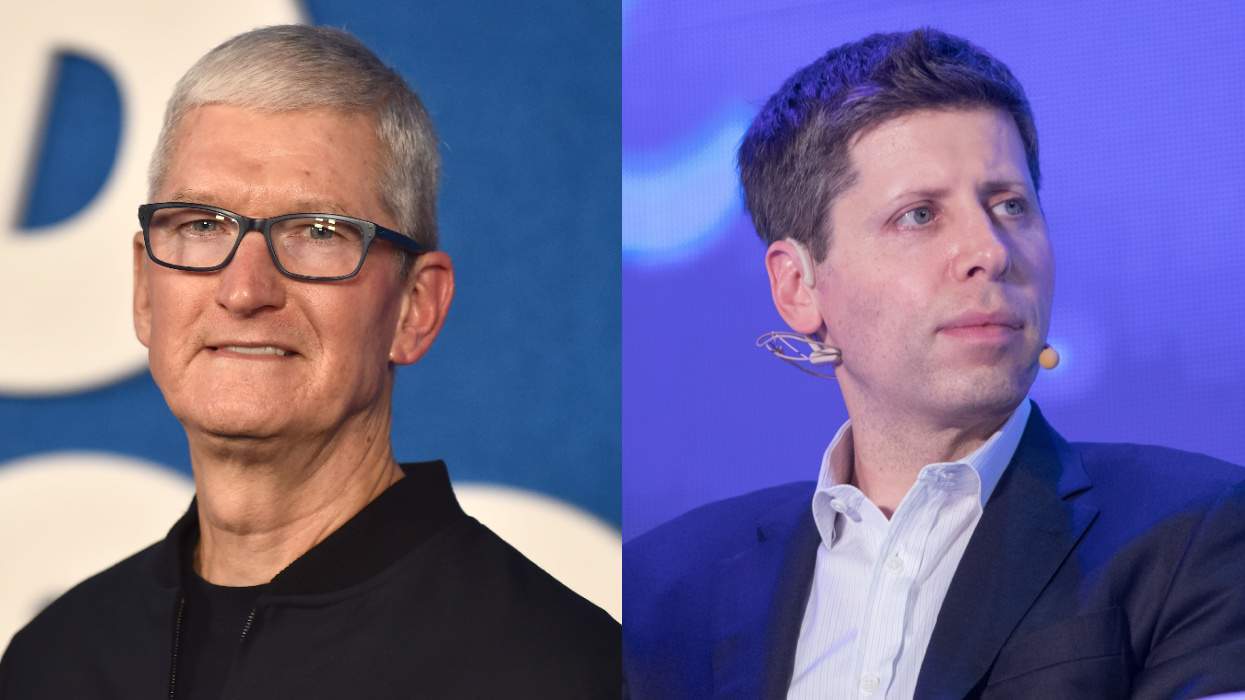LGBT innovators are disrupting their industries in new and exciting ways. In this special report, we look at leaders revolutionizing TV (such as Nafessa Williams as superhero Thunder in Black Lightning -- and The Magicians' Hale Appleman), fitness (Caleb Marshall), music (bell's roar, pictured above, center), comics (Gerard Way and Tee Franklin), stand-up (Matteo Lane, pictured above, right), nonprofit organizations (Rye Young), and more.
Sean Desiree: Hear Them Roar
This musician and activist is helping queer people of color follow their dreams.
Sean Desiree is a person with a purpose. The genderqueer musician, who uses neutral pronouns and performs as bell's roar (uncapitalized in honor of the name's inspiration, feminist writer bell hooks), is on a mission to help others pursue their artistic dreams.
Desiree says the motivation for creating an arts-funding program was born out of the 34-year-old's own experiences as a young queer person of color, struggling to create music.
"Starting out as an artist, there's definitely a lot of expenses, especially for queer and trans artists of color," they explain. "I mean, it's just hard to survive in general, [and then] trying to create art can seem impossible."
So Desiree created the Art Funds Art Tour, a 10-day performance tour that morphed into a blossoming nonprofit organization. "It's not as satisfying for me to just go and play bars or venues each night," they found. "I want to have some sort of mission or purpose with what I'm doing ... it's more than just about me. It's about building a whole community."
Desiree says programs for the arts -- like an after-school music one they attended at School of the Future (a progressive New York City public high school that's part of a Bill & Melinda Gates Foundation-funded effort to improve U.S. schools) -- can be life-changing, especially for young creative people of color. That experience is part of why Desiree wants to give back and "prioritize queer and trans people."
Following the release of bell's roar's debut album, We Carry Us (the proceeds of which go back into the fund), Desiree toured the East Coast. At every stop, two local musicians or bands were invited to open for bell's roar -- and got paid to perform. "I feel like everyone deserves to get paid," says Desiree, stressing the importance of increasing young queer artists' confidence and professional experience.
Providing grants to queer and trans artists one concert at a time is the AFAT (ArtFundsArtTour.com) mission, but also a direct response to massive budget cuts in arts funding expected by the Trump administration. "We have to figure out ways to support ourselves" in these challenging times, says Desiree.
The tour was only the beginning for AFAT. While most of the donations received have been from individual donors in the LGBT community, Desiree plans to pursue funding from larger organizations.
"You can't just have an idea. You have to prove it and show the numbers, show that it makes sense for them to sponsor the event," explains Desiree. Cutting through all the red tape in the beginning "can be discouraging," but it's a necessary part of the process.
All of bell's roar's music is 100 percent created by Desiree, who says, "It took a while to kind of create songs for myself that I liked" as well as "to build up the skills to be able to produce it myself." Ultimately, Desiree continued to work on their music alone because they wanted "to create a project that's completely ideas of my own, and it's hard to do that if I have someone else's influence ... because even unintentionally, you kind of defer to other people, or silence yourself in some ways."
Desiree's creative gambit paid off with their debut, We Carry Us, where their light and lyrical speaking voice transforms into an ethereal instrument, blending seamlessly with the album's dreamy, hypnotic beats. Though thoroughly modern, the album's melodic tracks venture from haunting ("Fake Fantasy") to almost folksy ("Dear Me") -- and even display earthy, ancient undertones on songs like "I'm Trouble." As bell's roar, Desiree is a brilliant musician who is also providing a wonderful avenue to support other emerging queer artists.
(bellsroarmusic.com) --Desiree Guerrero
Hale Appleman: All Hail the King
In The Magicians, Hale Appleman plays a gay royal empowered by his own otherness.
Playing the queer king of a fantasy realm is a dream come true for Hale Appleman and he's taking full advantage of the opportunity in Syfy's The Magicians, now in its third season. While instilling a natural-born leadership into Eliot Waugh, High King of Fillory, the character beautifully brought to life from the best-selling Magicians trilogy by Lev Grossman, Appleman doesn't take lightly the impact a queer king can have.
"I didn't have an Eliot growing up, but I'm glad Lev created him, and I'm proud I get to play him," Appleman says. "I think his sexuality is inherent to his story arc in that it's an essential part of his identity." In previous seasons, Eliot was married off to a woman, but now his sexuality is referred to in broad strokes, yet to be fully explored.
"It would be great to see him have more fully realized relationships with men in both sexual and nonsexual contexts," the actor says. "While I don't think Eliot is a stranger to fluidity or new experiences, I do hope he gets to have a real relationship with a man soon. I think it's important to explore Eliot's sexuality unapologetically, now more than ever."
Appleman adds that in real life, he is "definitely not straight. I am about as queer as Eliot and at least as open and fluid when it comes to supernatural beings, women, and everything in between."
As for bringing the beloved Eliot to life, the actor credits the director of the pilot, Mike Cahill, who used the Italian word sprezzatura ("effortless" or "studied carelessness") to describe both Eliot's ease with magic and his interaction with the world. "[Eliot's] skill is either an optical illusion [because he secretly practices] or he is so innately gifted that his mastery is an extension of his being."
Growing up in New York City's East Village, the son of a modern dancer mother, Appleman was destined to be creative. "To create with my hands was my first impulse," he says. As a lover of the fantasy genre ("Tolkien, Narnia, L'Engle, Potter, The Princess Bride, I could go on," he says), The Magicians' adult stakes and consequences appealed to Appleman.
The nuances of coming to terms with one's truth are evident in Eliot's arc, which includes sex, shame, guilt, and deviance -- particularly when Grossman hints at Eliot's backstory: disowned by his family and community and perhaps a survivor of childhood bullying and abuse. "At one point, Quentin walks in on [Eliot] being dominated, physically, and verbally humiliated by a much younger student, which... I understood to be an extension of the oppression of his past," Appleman explains, adding that "it's charged, it's homoerotic, it's extremely complicated."
"I see Eliot as someone who has labeled himself a deviant before anyone else could. ... His deviance is a point of pride in this context." Clearly, Eliot's arc could take many trajectories in the coming seasons, but Appleman hopes for "a serious love interest who's present in more than a couple episodes," and for "a continued exploration of Eliot's character, his layers, his reasons for using humor as a defense... I hope he continues to be brave and deliciously uncompromised in his expression of self." --David Artavia
Nafessa Willimas: Is Like Thunder and Lightning
As TV's first black lesbian superhero, Nafessa Williams hopes to inspire other "little brown girls."
This January, history was made when Nafessa Williams slipped into the role of Anissa Pierce, a.k.a. Thunder, in the CW's Black Lightning. The groundbreaking show features the first black superhero family on network TV. Set in New Orleans, the show centers on family patriarch Jefferson Pierce (Cress Williams), a charter school principal who is struggling with a long-held secret. Nine years ago, he was gifted the superhuman power to harness and control electricity, which he used to keep his town safe as the masked vigilante Black Lightning.
Fearing that violence might spill over and impact his family, Jefferson left his superhero days behind to settle into a more stable life as principal and attentive dad. Now his daughters Anissa and Jennifer (China Anne McClain) are discovering they have superpowers of their own, which they embrace as Thunder and Lightning. Together, the two women inspire their dad to rise again and help save their city from rampant crime and corruption.
"I'm really honored," Williams says about playing Thunder. "We don't really get to see young, black women opposite each other on TV and film. I'm really proud to play a role for young lesbian women to see themselves [and] to see how loving and supportive the family is. I believe that families of lesbian and gay teenagers need to see that, if they're struggling with accepting their child's sexuality."
To get herself superhero-ready, Williams says she followed the example of one of her own idols: 1970s blaxploitation star Pam Grier.
"I went back and studied her and her action films. I think she's such a bad ass!" says Williams, who's been stunt training for the role since last summer. She adds that Black Lightning creator Mara Brock Akil "is another hero. I've always admired her... I just think she's so eloquent and classy and smart. How she tells stories ... and sets them up for black women to look strong and independent on TV, the messages that are within her writing. Then, she's beautiful as hell!"
Just as in the DC Comics series of the same name, Thunder has a love interest, a bisexual woman, Grace Choi, played on the show by Pretty Little Liars star Chantal Thuy.
Like her superhero character, Williams is a force to be reckoned with. The onetime law school student previously worked with the homicide unit in Philadelphia's district attorney's office.
"I've lived a life before getting into this industry," Williams says proudly. "I think that it's helped keep me grounded." Williams says that back then she would often cry at her desk, knowing that acting was what she was meant to do. One day, she decided to become "her own superhero" and went to an audition.
"They told me I couldn't go, I couldn't have time off, and I went anyway," she remembers. "I [returned] the next day, and I couldn't log into my computer. They fired me. I was literally fired for going on an audition -- but it changed my life."
A little over a year later, Williams landed a series regular role on One Life to Live and moved to New York City. "That was the confirmation that this is what I'm supposed to be doing," she says. "Life begins when you walk in your purpose. When you follow your dreams, you encourage other people to follow theirs."
Having grown up in the inner city of Philadelphia, Williams says playing Thunder -- whose major intention is to rid her community of crime while also inspiring kids to get an education -- is literally a dream come true.
"This [role] means a lot to me, for young black girls to see me come out of the same place they are in, and go off to be a superhero," she says. "My goal is to empower young women to walk in their own superhero, whatever that is -- whether you're a young single mother, whether you're a student, whether you are volunteering in your community."
"Who would've thought that this little girl in the ghetto in Philly would be playing the first black, lesbian superhero on network TV?" Williams asks rhetorically. "Ultimately, my goal is to inspire little brown girls that look like me, that are sitting on the porch wearing cornrows." --DA
Rye Young: A Second Act
Rye Young contemplates what will happen following his departure from Third Wave Fund, the renowned program he saved from going under.
When Rye Young became the executive director of Third Wave Fund, it was a gamble not only for the organization, but for himself. The organization created by and for women of color and intersex, queer, and trans people under 35 had hit financial difficulties in 2012, and board members spent much of 2013 deciding whether they should close its doors.
"We knew it would be difficult to attempt to jump-start the organization again," Young admits. "But there was so much love and hope in what could be rebuilt if given the chance. So, we decided to take the plunge and it paid off."
But he acknowledges it wasn't easy. "When I became the executive director, it was like managing a startup with a vast community of supporters across the country and a 15-year past steeped in movement history and nonstop organizational evolutions."
Now 20 years old, Third Wave began 2014 with no major donor pledges or committed grants. Young began fundraising by seeking small monthly gifts, creating a culture of asking for support, and "politicizing" the act of establishing recurring donations. Eventually, he says, "foundations liked what we were doing, and year after year, Third Wave Fund grew beyond my wildest expectations. The grant-making took flight, we were able to hire staff again, and the rest is history."
The director says that his staff, board, and community of volunteers accomplished this turnaround success "without a strategic plan and without a sense of where we wanted the organization to go once we stabilized. If that doesn't scream out for a strategic visioning process [now], I don't know what does."
While Young had lots of intangible assets at the beginning, he faced an enormous task in relaunching the organization: setting up a new board of directors, mapping out a fundraising plan, executing plans, and designing grant-making programs.
His philosophy was: "If I don't do it, it won't get done," and it fit well with his personality. "My leadership style was one that tended to not ask for help," he recalls. "I felt like I was doing a juggling act and when someone asked if I needed help, I felt like I would have dropped all the balls just to try and figure it out."
Things began to change by the end of his second year as executive director, when Young hired program officer Joy Messinger, and his role began to shift. "It was less my job to do everything alone, and more my job to support folks to step into their own leadership and to encourage their own way of seeing Third Wave Fund's work," he remembers. "And the more I let other people's visions for the work take root, the better the work became."
And that allowed him to think about the bigger picture, "Third Wave's importance is not about the size of our budget, it's about the size of our vision. There's no lack of money in philanthropy, there is a lack of money behind radical grassroots visions and approaches to change. Success had to be grounded in our core purpose, and growth would come from that grounding."
Young also posited that to be successful, Third Wave Fund would eventually need to run without him -- and its leaders needed to stay healthy while doing the work.
"I thought, if an organization must burn out of its staff to build power, then that's not building power, it's just taking fuel from other sources like the human mind and body. I thought that these two things -- planning for my departure and resisting burnout -- were deeply connected and needed to be integrated into my leadership approach."
Young also knew he needed to be "mindful that what was manageable and sustainable for me was completely dependent upon being able-bodied, white, class privileged, and male, in a world that values all of those things -- and that Third Wave Fund's future staff and leadership must be more closely connected to the issues we address than I am."
The activist says he doesn't want to minimize the oppression he faces as "a Jewish queer trans man, but when you hold those privileges that I do in one package, it has a profound impact on the ease through which I live my life and has a mitigating effect on any oppression I may face because of my marginalized identities."
Young, who began working at the organization as an intern in 2008, will be leaving Third Wave Fund this year. Having spent a decade with the organization, Young reflects on the experience: "I grew up here. What I love most about working at Third Wave is how we allow people who are used to feeling disempowered by philanthropy to shape a new way of doing things that is empowering."--Savas Abadsidis
Matteo Lane: He Will Never Stand-Up Straight
Out comedian and ghost hunter Matteo Lane is on his way to stardom.
Matteo Lane is one of only a handful of gay male stand-up comedians in the U.S. who has garnered in-demand spots on The Late Show With Stephen Colbert and Late Night With Seth Meyers. He's also appeared on Comedy Central's The Comedy Jam and Adam Devine's House Party, and is part of Netflix's comedy specials featuring rising stand-ups.
Now he's picking up even more steam hosting Ghost Hunt, an eight-episode unscripted comedy series that debuted on Snapchat's Shows platform. Each episode, Lane helps a real person track down someone from their romantic past who ghosted them (suddenly stopped all communication) and ultimately brings them together for deep "ball-busting and closure."
Born and raised in Chicago, the funnyman's first passion was drawing -- a talent that got him into one of the most prestigious art colleges in the country: the School of the Art Institute of Chicago.
"I studied painting and drawing," Lane remembers, adding that his college years were among the most formative. "I was surrounded by weird people -- there were no jocks to be found to call me f****t."
After he moved to Italy to study art, Lane's talent quickly got him a job illustrating for commercials in New York City. Then his other talent became more enticing.
"The second I went to an open mike night, I was like, 'This is where I was meant to be.' Before then, I always felt left out. I'm an insecure person, very introverted in a lot of my thinking. I tend to be pessimistic. It's a weapon I use against me."
Maybe that was why he was attracted to other acerbic comedians. "I fell in love with Kathy Griffin when I was 17 years old because I understood that kind of catharsis and related to [Griffin's] frustrations. I related to that voice: the loser on the outside -- catty, funny, and talking about the things I was interested in talking about. Then when I saw Joan Rivers, that was it. I truly believe that [Rivers] might be the biggest inspiration in my life. Sometimes before I go onstage I say, 'OK, this is for Joan.'" Unfortunately, he never got the opportunity to meet Rivers before she passed away in September 2014.
He didn't feel the same connection with male stand-ups like George Carlin and Richard Pryor. "I wasn't attracted to that world because I didn't think those people spoke my language," he recalls.
Gay male stand-up comedians like Joel Kim Booster, Julio Torres, Solomon Georgio, Guy Branum, and Tim Dillon are growing in popularity, but Lane says they are still the minority in the industry. "There's no Richard Pryor* of gay men. There's no Louis C.K., no Bill Hicks," he says, even though "we have Ellen DeGeneres, Margaret Cho, Wanda Sykes."
"I think there are a number of reasons as to why," Lane explains. "I think this country is obsessed with masculinity and sees gay men as a threat. [Today], being gay is more normalized. We're able to finally enter the male locker room of open mikes and be seen as equal, be appreciated, whereas before we didn't feel like we had the opportunity to speak our truths."
Lane says the growing popularity of gay stand-ups is trailblazing "because there are no rules that have been established for us. Everything we're saying [onstage] is a first -- literally."
Starting out, Lane says, most stand-ups fight against expectations, and he was no different. "There's a long time in comedy that you fight stereotypes, until one day you just accept who you are, and say you know what? I am gay and I am proud. It's what separates me and makes me different."
"Straight guys can talk about whatever they want, I'm constantly figuring out and regulating whether I can talk too much about this, not about that. How deep can I go ... without alienating the audience? It's a weird struggle and I'm figuring it out. But I love it. I fucking love it." (MatteoLaneComedy.com)--DA
*Ironically as we went to press, Richard Pryor's widow, Jennifer Lee Pryor, confirmed that the late comedian was bisexual.
Jane C. Esther: Mission to Mars
Jane C. Esther explores lesbian love in a future where Mars may be Earth's only hope.
While working as a librarian by day and living with her wife and dog in New England at night, Jane C. Esther penned her brilliant debut lesbian sci-fi novel, The Universe Between Us. Set in a both brighter (gay is normal) and bleaker (environmentally, Earth has fallen to shit) future, the story really centers on an evolving love between two women -- one of whom is about to embark on a covert mission to colonize Mars.
"Visiting Nebraska inspired me to write a story about what I saw happening there, which was river beds dusty from drought, and farmland that won't be there by the end of the century," Esther admits. "It got me thinking, in the next few decades, how will our planet change, which desperate measures will we take, and what will hope look like?"
Esther -- whose idea of fun encompasses microscopes, "trashy TV about the British royal family," and Broadway show tunes -- says she feels fortunate to be a part of the growing queer visibility.
"I'm so thankful that I grew up at a time when queer experiences were starting to be shared in the media. Watching and reading about other LGBT people was a way for me to feel less alone. I hope that my story, which normalizes queerness in the future, contributes to a world that values all voices and the stories they have to tell."
Esther is already working on finishing her highly anticipated second novel with Bold Strokes Books, which will be another lesbian sci-fi romance (this time involving mental telepathy and alien contact) -- and is set to be released in 2019.--DG
Tee Franklin: Our Favorite Black Geek Girl
This disabled artist breaks boundaries with a graphic novel and a lesbian love story for the ages.
Tee Franklin made a name for herself in the comic book world before she ever wrote one of her own. She launched #BlackComicsMonth in February 2015 to draw attention to talented indie black comic creators as well as the diverse comic book characters and superheroes that already exist but are not well known.
Then Franklin raised almost $60,000 from Kickstarter and launched her own publishing company, Inclusive Press, to produce her graphic novel, Bingo Love -- which later won Prism Comics's 2017 Queer Press Grant. The book is a story about two queer women of color who fall in love as teens but are torn apart by their parents only to be reunited decades later. Their relationship must overcome the ensuing years, heterosexual marriages, and children. The story of Hazel and Mari acknowledges the way homophobia can disrupt lives and yet suggests it cannot stop the hands of fate or prevent true love from finding fruition.
What really sets Bingo Love apart is how different the main characters are compared to the usual stars of comic books and graphic novels. It's not just that much of the story revolves around two black women over 50, but also that the narrative -- and art -- is remarkably authentic and true to lives of real women. "Nobody is perfect," Franklin says. "And their slight imperfections give them a bit more character."
That authenticity comes out in the depictions of black hair (Franklin jokes about how poorly black women's hair is drawn in comics, with "weird afros and braids that aren't attached to anything") and in the women's visible stretch marks. "Women, especially women who've been pregnant, get stretch marks," Franklin says. "Real women have stretch marks. Why would I create a book with older women as leads and not have stretch marks or saggy boobs on them? It defeats the purpose!"
And then there are the elements that raised a surprising level of criticism. As Franklin told The Washington Post, "Having two older black women, especially one [Hazel] who is darker skinned and plus-sized, I was told that I was ruining comics by having this. Hazel was called very derogatory names."
Some accused Franklin's Hazel of embodying derogatory stereotypes. "Hazel was called a 'mammy,'" Franklin says. The mammy caricature -- epitomized by characters in films like Birth of a Nation and advertisements for Aunt Jemima pancake flour -- characterized indentured women as, Franklin explains, "proud and 'happy' to be slaves. A darker-skinned mammy was usually obese and always had a smile on her face. Her duty was taking care of her 'white family.'"
Asked why some people would accuse Hazel of being a mammy, Franklin is blunt: "Racism." She continues, "When it comes to Bingo Love, racists claimed that Mari was the Master and she owned Hazel."
That even a black female writer can be accused of creating derogatory portrayals of black women simply because she dared to depict a fictional character as a woman of size who has dark skin hints at how powerful these representations can be, and how rarely we see plus-sized women and women with dark complexions in mainstream media.
"Representation matters," Franklin says. "It's important to be able to see yourselves reflected" in the media that we consume. Since there's so few comic books written by black women, Franklin felt compelled to add her own voice to the mix as a disabled queer black female creator. And she infused a lot of herself into Bingo Love. Franklin herself came out later in life and understands how factors like stigma and homophobia, and a desire to make our families happy, make it so there will always be people who can't come out when they are young.
Although Hazel and Mari are only able to reunite in their autumn years, Franklin depicts the time they have together as adventurous and empowering and sexy. Still, she doesn't shy away from realities of aging and mortality. But Franklin is adamant that Bingo's love story has a happy ending. "They end up together," she points out, adding that she's "sick of the 'kill your gays' trope," in which someone always ends up dead in gay and lesbian romances portrayed on the small screen. It was important, Franklin says, that Bingo Love presented a different kind of ending. "It is a happy ever after," she says, because they are still together in the end.
Bingo Love was picked up by Image Comics and released on Valentine's Day -- something Franklin says would never have happened if she hadn't first self-published through Inclusive Press, and promoted the graphic novel at comic book festivals and with Kickstarter. Now she's looking forward to helping other marginalized creators find an outlet -- and we're looking forward to her next project. -- Jacob Anderson-Minshall
Gerard Way: Happy to Be Doomed
Rock star Gerard Way proves he's a multitalented creative with the comic series Doom Patrol.
With his Umbrella Academy live-action series coming to Netflix and his stint helming DC Comics' Doom Patrol breaking sales records, former My Chemical Romance front man Gerard Way may have found the formula for happiness.
When he first considered taking on Doom Patrol, DC Comics' misfit band of superheroes, Way says he "wasn't sure if I was willing to tackle it, especially following what Grant [Morrison] had done."
Morrison's tenure (which was then followed by trans writer Rachel Pollack's) remains legendary for introducing a plethora of acid-trip-induced characters like Danny the Street -- a cross-dressing, sentient city street whose dialogue emulated what Way describes as "a gay slang code language used when homosexuality was illegal in the British Empire."
"Danny was something so specific to Grant, and I knew I couldn't do it the same way," admits Way, who says he has "a very close relationship," with Morrison. "So I went to Grant and said, 'I want Danny to be a whole world, not like an alien world, but kind of like a theme park, like Danny-Land, and put that whole world inside of [an] ambulance.'"
Changing Danny was a significant pivot for the character, who then became central to the new series. "I made him a little more powerful than he used to be, like he used to talk through signs and letters on the fridge. Now he can create avatars and he can actually speak."
Way stayed true to Morrison's vision of other Doom characters while pushing the envelope with Flex Mentallo, whose "original story arc was so transcendent, incredible, and meta," Way raves. "And I'm just using him as this fitness-nut beach guru -- and it works. I talked to [artist] Nick Derington and told him I thought Flex should look like he was out of a Tom of Finland drawing."
Way feels Doom Patrol is ripe for exploration and diversity -- especially when it comes to gender and sexuality. After all, it already included Rebis, "a divine intersex" person, and Coagula, one of the first transgender women to grace a mainstream comic.
For a generation of LGBT youth -- especially trans kids -- Way's genderfluid performances with My Chemical Romance freed expectations around gender identity and expression. Way often avoided questions about his own gender identity and sexuality until he came out as gender-nonconforming on Reddit in 2015. He still uses male pronouns, but says, "I didn't feel like I fit into being a masculine man and there were certainly things throughout my childhood and my life that enforced that, and when I started doing more outre things in My Chemical Romance, it led to more exploration."
A major turning point for Way was when he saw his good friend Laura Jane Grace undergo her gender transition: "That moment really spoke to me. ... [It] really resonated because of my past identity issues, and she made me realize that it was something I'd always felt passionate about and was no longer ashamed of addressing."
Now he says he's happy to be a role model, and "humbled to hear these kids tell me I gave them the courage to come out of their shells."
Way wants to stay positive in the face of adversity, saying, "Last year was really rough for most of us. Doom Patrol is my response." --Savas Abadsidis
Tygh Lawrence-Clarke: The Family Man
Tygh Lawrence-Clarke is a mixed-race trans man with a white son, and he's navigating transition at midlife.
There's a common misconception that all transgender people have known of their true gender identity from an early age. But this isn't necessarily true. Transitioning comes in many forms -- even at different stages in life, as Tygh Lawrence-Clarke, who began his transition three years ago, knows well. Now 53, he's making a difference in the trans community through his website, Transgender Visibility Matters, and as cofounder of The B Cup Project, a Facebook page promoting trans art and inspired by Buck Angel's daily talks about positivity. As a family man, Lawrence-Clarke also documents his transition on YouTube, where he talks about the dynamics of being both a father and a husband, and how this experience has shaped him.
What gave you the idea to start Transgender Visibility Matters? Has it changed you?
I wanted to advocate for more inclusion and recognition of all the gender-nonconforming individuals from around the world, so I set up this website as a means for people to educate themselves. The whole concept is to put us out there. I want to stand up and be visible for those who can't, for fear of their lives. It's made me more aware of what the transgender community might need. I also do binder giveaways -- and the donated ones I receive I send to Third World countries.
Can you tell me about The B Cup Project and how it got started?
Buck Angel does a thing called "The B Cup" every morning on social media where he just talks and invites everybody to have a conversation with him. There's so much negativity within the trans community that we decided to create this project to show positivity and to have a safe place for people to go.
Has your relationship with your family changed since transitioning?
I think my son and I are actually closer since I came out and transitioned. I think we understand each other better. My wife has never failed in her support of me, but I won't deny that there have been challenges. She has told me her biggest fear is that my transition will change my feelings about her. My feelings for her have not changed, but the way in which I express my feelings has. I am less emotional than I was pre-testosterone. This has been a challenge that is still a work in progress.
Did you feel pressure around becoming a father?
My biggest concern with Ben is that others will bully him because of me. It hasn't happened yet, but he just started high school, so it's still a possibility. I don't know that I feel pressure specifically related to being a father, but I do feel pressure related to presenting as male. I'm self-conscious when speaking to cisgender men because I don't really know how to talk about "guy stuff." I'm also more self-conscious when I take Ben places, because my dark skin makes it obvious that he is not biologically my child, so I think others might question our relationship.
Can we talk more about that?
I get strange looks when I'm walking with [Ben], who is taller than me, has red hair, and very white skin. It could be because I live in New Hampshire, which is not very racially diverse. My mother was half black and half white. My father is Indian -- his parents were born in India. As you can imagine, growing up in Beverly Hills I didn't really fit in with typical ethnic stereotypes and never knew what box to check when filling out forms that asked about ethnicity. It's interesting now how I am experiencing a parallel process with my gender identity as I'm still sometimes uncertain what box I fit into due to the fact that I'm not completely binary. So, ultimately, I decided that labels don't really fit me. Unfortunately, others still make assumptions about me based on the color of my skin. I've noticed this to be especially true since I've transitioned to male. Now I'm very aware that some people perceive me as more threatening as a brown-skinned male than when I presented as a brown-skinned female. Women pull their kids closer to them and most times don't look me in the eye. [Sometimes] I actually fear for my safety because looking at me one might assume I am Middle Eastern, Hispanic, or African-American.
What advice would you offer to couples and families going through a transition?
Good communication is essential. My wife is more patient with my puberty-influenced behaviors when I explain what I am going through. Also, we started preparing our son for negative reactions from friends and classmates almost immediately. We would role play different scenarios, and discuss how he could handle them. We also try to regularly check in with him about any pressures he is feeling about my transition. --Cole Hayes
Caleb Marshall: Fire Marshall
Caleb Marshall burns down the house as an international dance-fitness superstar, with millions of die-hard fans.
Since 2014, Caleb Marshall, also known as "The Fitness Marshall," has been inspiring millions of YouTube viewers to get fit with his dance-based workout videos, which have earned him a massive social media following (1.1 million YouTube subscribers and growing).
Marshall takes the hottest songs from the music charts and choreographs heart-pumping dance routines alongside his "Backup Booties" (his name for his backup dancers). Since catapulting to stardom, Marshall continues to tour around the world with his sold-out cardio concerts.
Often referred to as the Richard Simmons of Generation Z, Marshall is becoming one of the most beloved social media figures today -- and it all arose from the ashes of a traumatic breakup.
"I was going through a terrible, terrible breakup with the guy I thought I was going to spend the rest of my life with," Marshall reflects. "I created the YouTube channel to feed my soul and lift me up, and help me take all of my negative energy I was feeling and put it into something positive, and something that made me feel sexy and confident and of value."
Four years later, Marshall has teamed up with DanceOn -- a leading digital music entertainment brand for Millennial and Generation Z women cofounded by Madonna -- to release his new series, Life of a Fitness Pop Star, exclusively available on Verizon's streaming app, go90. (go90.com)
The show features Marshall's move from Indiana to Los Angeles alongside his best friend,s Bria and Haley -- his permanent "Backup Booties" (the latter whom he previously dated before coming out as gay) -- and Cameron, his current boyfriend and manager. Viewers get to see what happens when the music stops and personalities collide.
"We feel things very deeply and we express that to each other, and it gets uncomfortable really fast," Marshall says of his crew. "But also, at the end of the day, we're best friends. So we always are going to love each other, we're always going to figure it out, and we're always going to become stronger from it. We're never trying to one-up each other. It's really just figuring out what it means to be fit as pop stars together."
The move to L.A. is a realization of a childhood dream for Marshall. "I've always wanted to be here, literally ever since I can remember," he says. And he knew he was destined for greatness -- just like his role model, Britney Spears. As a "closeted gay kid," Marshall saw Spears doing a back flip in a "pink crop top" in an infomercial and immediately demanded that his mom buy her album. The pop star's essence has been ingrained in Marshall's showmanship ever since.
"I started taking these fitness classes, and then I realized, OK, maybe one day I can teach this," he shares. "Because if they're going to give me this little headset, then I can actually be Britney Spears. So I started teaching [dance classes], and that's when I realized, this is it. This is what I've been missing."
As an overweight, closeted teenager growing up in a small town, Marshall remembers, "My family was very conservative and obviously very antigay and very Christian. It was a very scary place for me to grow up, feeling like I didn't belong in school or, really, in my family."
That's when he found dancing: "I would dance and perform, and that was my outlet, how I felt like I belonged," he says. "When I was dancing with my friends ... I felt like I was included." He adds, "That's how I got through it until I eventually came out."
From the beginning, Marshall has encouraged people of all shapes and sizes to join in on the fun, and many of his videos include plus-size dancers, grooving to his choreography. But he didn't go out of his way to recruit people of size. Everyone he spotlights in his videos are his real friends.
"My real friends are just real people who look different, act different, and come from every walk of life," he says. "It was never this curated thing. ... In the beginning, before there was any money, any success, I was wrangling any of my friends that I could. I would switch them [out] every video. And I think it was beautiful that everyone around me got to see different types of people because there really isn't representation. You don't see people of color or people of different sizes in all these picture-perfect dance videos."
His dance videos seem to have the power to heal and create change. "I started getting letters from people saying that I have helped them through sexual abuse, or their parents disowned them because they were gay, or they just found out they had HIV and were now doing the dances to feel sexy and love their body again and not be ashamed of themselves," he says of his impact.
"I realized that it's about everybody else [who] this impacts, [to give] them the same feeling it gave me when I was at my low point. [Dancing is] this magical feeling of release and of nothing else mattering. That's how I want everyone else to feel." --DA
The Judicial Warriors
A trio of legal eagles are battling rollbacks in LGBT rights from Congress and the White House, and pushing for protections -- with very little fanfare.
SHANNON PRICE MINTER is the legal director of the National Center for Lesbian Rights. In 2009, he was lead counsel in the landmark California marriage equality case. One of the best-known transgender lawyers in America, Minter fights for equality for all LGBT folks, and played a lead role -- with Jennifer Levi (below) -- in stopping Trump's planned ban on trans people in the military.
JENNIFER LEVI is the director of GLBTQ Legal Advocates and Defenders' Transgender Rights Project. A law professor at Western New England University, Levi continues to serve as counsel in high-profile cases that have secured basic rights for trans people, including tax deductions for gender-confirmation surgeries as well as medical care policies in federal prisons.
REGGIE SHUFORD is the executive director of the American Civil Liberties Union of Pennsylvania. In his storied career, his cases have spawned incredible discussions around social justice and civil rights at local and government levels. As an attorney, he defended a trans student who was forced to use his birth name, and played a role in overturning his state's voter ID law and its prohibition on same-sex marriage.
Our Favorite Innovators
The world of entertainment is progressing quicker than most of us realize, thanks to these incredible trailblazers.
HALSEY The bisexual, biracial, bipolar singer's "Bad at Love" (in which she sings about being in love with both men and women) from her second album, Hopeless Fountain Kingdom, became her first top five entry on the Billboard Hot 100. Last January, she shared a powerful poem at the Women's March in New York City, talking about being sexually assaulted by an ex-boyfriend. She's also open about passing as white (but being black) and dealing with mental health issues.
LENA WAITHE made history as the first black woman to win an Emmy Award for outstanding writing for a comedy series (on Master of None). Waithe thanked her longtime girlfriend, Alana Mayo, in her acceptance speech. Her Showtime series, The Chi, was renewed for a second season earlier this year.
ALIA SHAWKAT The bisexual Arrested Development actor is branching out and gaining universal appeal for her Gracie Award-winning role in Search Party -- a character she described to The Guardian as a "hipster Columbo."
MUNROE BERGDORF gained global recognition as L'Oreal's first transgender model to front a campaign for the brand in the U.K. Later fired for sharing her views on white complicity in the wake of Charlottesville, the model wrote on Facebook, "Most big brands did not want to sell to black women. Most big brands did not want to acknowledge that there was a huge demographic that was being ignored."
AMANDLA STENBERG Best known for playing Rue in Hunger Games, the nonbinary actor and artist makes no apologies for living life on her terms. "I don't think gender even exists," Stenberg said to Vogue. "My sexuality is very fluid and my gender is very fluid ... I don't think of myself as statically a girl." Next up: Stenberg has three films out in 2018, including Where Hands Touch, The Darkest Minds, and The Hate U Give.
EZRA MILLER The queer and gender-fluid actor has become a box office darling, thanks to movies like Justice League and Fantastic Beasts and Where to Find Them. Delightfully transparent, Miller holds nothing back when talking about his personal life. "I'm queer," Miller told Out. "I am very much in love with no one in particular." While we await his 2020 starring role in Flashpoint, next up is Fantastic Beasts: The Crimes of Grindelwald.

